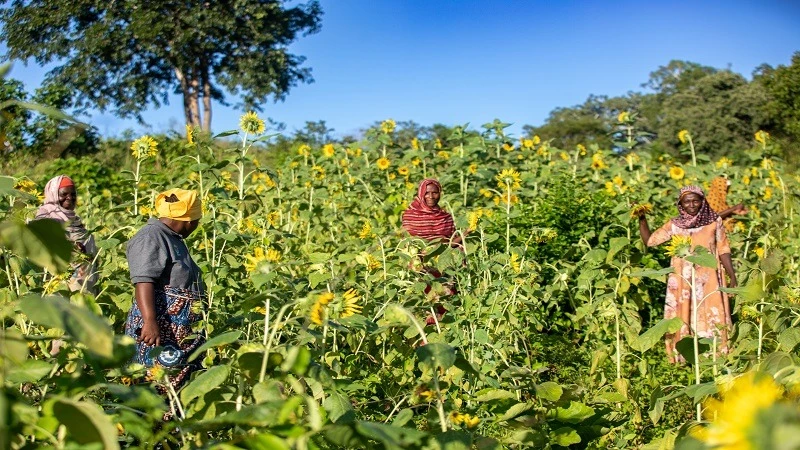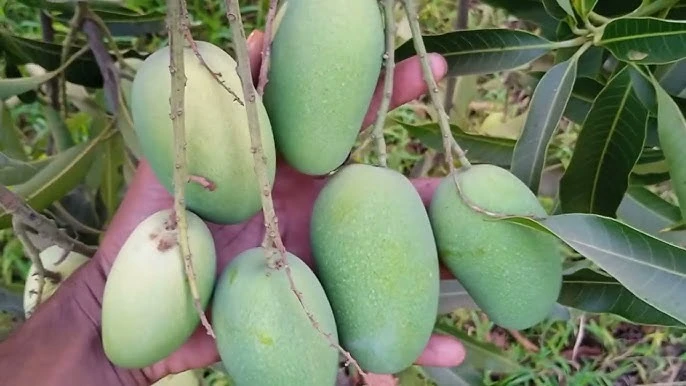Forest conservation transforms livelihoods in Kilwa District

FORESTS have numerous benefits to the environment and our lives. These benefits include absorbing carbon dioxide from the atmosphere, helping to mitigate climate change and maintaining the water cycle by promoting rainfall and preventing runoff.
Millions of people, especially in rural communities, depend on forests for jobs, food, and fuel. Forests provide timber and non-timber forest products such as honey, medicinal plants, and firewood. In some rural areas, many forests attract tourists, contributing to local economies.
Kilwa District in the Lindi Region is one of the areas where forest conservation is being undertaken by villagers with support from the government, Non-Governmental Organizations, and international donors. The district is known for its biodiversity and traditional forest management practices.
The Mpingo Conservation Development Initiative (MCDI), with support from the World Wide Fund for Nature, implemented the Bengo Forest Landscape Restoration (FLR) project in Kilwa District for five years (2020–2024).
It focused on strengthening Village Land Forest Reserves (VLFRs), promoting community-based forest governance, and improving livelihoods by increasing income from forestry and agriculture value chains for community members through sustainably produced agricultural and forestry products to enhance marketability and connect farmers with appropriate private sector partners to support production and marketing.
There have been many achievements for the residents in the villages where the project was implemented. These achievements are visible at the individual level and across the entire community.
Speaking to The Guardian recently, Salehe Likupwa, Liwiti village chairman in Likawage ward, said that before the project, most people lacked knowledge about forest resource conservation, but now everyone is educated, and forest products are sold in an organized manner, resulting in increased income.
“The money we earned from selling forest resources enabled us to build two classrooms, one teacher’s house, and contribute to the school feeding programme. The village government gives TZS 50,000 to every pregnant woman to help buy delivery kits. We also provide TZS 50,000 to each student who passes to join secondary education (Form One). This money is meant for purchasing school needs like uniforms, exercise books, and stationeries.”
Likupwa said the village earned TZS 58 million from selling forest products, mostly timber and logs.
“We are thankful to MCDI and WWF for bringing this project because forest conservation education has reached many. Now everyone protects one another. Villagers have also received education on conservation agriculture, where most of us are now aware of the impacts of shifting agriculture,” he added.
“Currently, the forest situation is good. People farm systematically and stick to one farming area. Through conservation agriculture, yields have increased from 10 to 28 sacks of sesame per acre,” said Likupwa, adding that other crops grown in the village include rice, maize, and sorghum.
Amani Salum, Secretary of the natural resources committee in Liwiti village, said the environment has greatly improved, as people are now enthusiastic about tree planting. If a tree is cut, another must be planted.
Salum said: “We are thankful for this project because we no longer experience illegal logging and harvesting. The education on conservation farming has helped to improve our yields and reduce Human-Wildlife Conflicts (HWC) as villagers now farm in a designated area. Previously, we walked long distances to clear forests for new farms.”
Mchakama Village Chairman, Mohamed Ndyengu, told The Guardian that villagers are no longer practicing shifting agriculture due to education provided by the government and stakeholders. He said direct sowing has improved conservation and harvests.
The village is also benefiting from conservation efforts; in 2023/2024, they collected TZS 11 million, which was used for development projects. From forest earnings, they also built a village office, dispensary, and supported school meals.
Nanjirinji A Village Chairman, Shaban Majumba, said: “Shifting cultivation is no longer common in our village. The education from MCDI has changed how we prepare our farms. We are seeing the benefits of conserving forests as health and education services have also improved.
Forest conservation has succeeded due to various efforts by the government and stakeholders to ensure better land use planning. We have demarcated residential, grazing, and farming areas.”
Asia Ngakola, a resident of Nanjirinji A, said that the introduction of conservation farming has greatly helped them conserve their village forest, as people no longer cut trees or graze animals in the forest.
“We are benefiting from conservation activities; primary school leavers joining Form One are financially supported. Pregnant women are also given TZS 50,000 for buying delivery kits,” she said, adding they also constructed a better village office and furnished it.
Ally Ngwali, a member of the village natural resources committee in Nanjirinji A, said that one of the main responsibilities of their committee is to ensure forest safety by conducting regular patrols.
“We face challenges from farmers from other districts who cut trees to clear land. Sesame farming contributes significantly to forest destruction because farmers are forced to establish new fields every two to three years.”
Milali Kologo, Kilwa District Forest Assistant Officer, said that Kilwa District is fortunate to have many forests, both protected by law and unprotected. The legally protected forests include those under the Tanzania Forest Agency (TFS), village forests, and district council forests. Village forests cover 100,050 hectares.
“We have set by-laws to ensure proper forest resource management. Many forests already have forest management plans. Those under harvesting have approved harvesting plans.
The Forest Act, 2002 requires us to conserve forests for current and future generations. To achieve this, we conduct forest patrols and ensure sustainable harvesting.
Patrols help prevent illegal logging and protect endangered tree species such as Mpingo, Mivule, and Mninga.
We are grateful to stakeholders for educating the public. All Kilwa forests are natural and must be protected. MCDI has also helped establish tree nurseries to distribute seedlings to villagers,” said Kologo.
He added: “We have some challenges; some people still cut trees without permits, and financial constraints sometimes make patrols difficult, as the activity requires funds for fuel and ranger allowances.”
He added: “We are promoting agroforestry where farmers grow vegetables alongside trees.”
Women empowerment
Asia Maimula, Secretary of the Tujikomboe Women Group in Liwiti village, Likawage ward, said: “Before we received education, we practiced shifting agriculture, but now we conserve the environment through conservation agriculture, and our harvests have increased.
Women's participation in conservation has also grown. Many grow cash crops and have improved their lives by building better homes and educating their children.
I’ve increased my yields through conservation agriculture; I have a 10-acre farm where I grow sesame, rice, and maize. I renovated my house using the money earned from selling sesame last year.”
Maimula added that their group started cultivating sunflower in 2022/2023 and has harvested well. The group of 10 members is proud of growing sunflower because, besides earning money, they also get cooking oil.
“Last year, we shared TZS 160,000 each from the profits after selling the oil. This year’s harvest might be lower due to pests that are greatly damaging the crop, especially sunflower,” said Maimula.
Somoe Mkunguru, a member of the Tujikomboe Women Group in Liwiti village, said: “We appreciate the support from MCDI and WWF because through sunflower cultivation, we have conserved our forests as we earn a good income by selling sunflower oil.”
Halima Mandindi, Secretary of Maendeleo Kwanza Women Group in Mchakama village, said the group of 20 members was founded in 2021. They produced 380 liters of sunflower oil in 2021 and 236 liters in 2023.
“We couldn’t produce cooking oil last year as floods swept away all the crops,” said Mandindi, noting they use part of their revenue to repair the processing machine, and she appealed to stakeholders for help with maintenance costs.
Khadija Said, a resident of Mchakama village, praised WWF and MCDI for initiating the project that has changed lives through sustainable farming practices—conservation agriculture.
She added: “Besides producing sunflower oil for our group business, our families enjoy tasty and nutritious meals. We only lack a permanent stall to display our products, which affects our sales.”
Ndyengu, the Mchakama Village Chairman, praised MCDI for empowering women, saying the project has benefited nearly all villagers. He said everyone now knows about sunflower cultivation and owns a sunflower farm.
“Sunflower farming is our savior; not only women, but men also cultivate it due to its economic potential. The sunflower processing machine in our village has encouraged people from other villages to grow the crop. Farmers in Mavuji, Kiwawa, Mkundaji, Hoteli Tatu, and Mandawa are also growing it.”
Joel Fares, Field Officer, Mpingo Conservation and Development Initiative (MCDI), said there have been great achievements as shifting cultivation is no longer the norm. Villagers can now use non-timber forest products to generate income.
The Bengo project mainly involved restoring damaged village and national forests. The restoration included tree planting in Mchakama and Liwiti villages, as well as establishing nurseries and farms to reduce pressure on natural forests.
Fares added: “We also promoted fruit tree farms to help villagers generate income and introduced vocational training (carpentry) for youth.”
Under the project, MCDI introduced conservation farming to villagers, and women’s groups were formed to ensure they benefit from the education. They were also trained on value addition, leading many to sell processed cooking oil instead of raw sesame.
Top Headlines
© 2025 IPPMEDIA.COM. ALL RIGHTS RESERVED

























